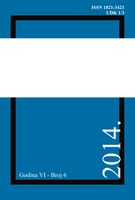Aktuelna reforma savremene zajedničke poljoprivredne politike Evropske unije u svetlu ekoloških zahteva EU
The ongoing reform of the contemporary common agricultural policy ot the european union in light of the environmental requirements of the EU
Author(s): Anđelka Aničić, Lidija MadžarSubject(s): Economy
Published by: АЛФА БК УНИВЕРЗИТЕТ
Keywords: The Common Agricultural Policy of the EU (CAP); agricultural subsidies; CAP reforms; organizational structure of the CAP; environmental dimension of the CAP; Cross-compliance mechanism of the CAP; Health check reform; ongoing CAP reform proposal
Summary/Abstract: At the beginning of the XXI century, modern society faces a worrying lack of limited natural resources. Traditional farming has led to the emergence of enormous environmental costs and agricultural externalities. The above mentioned problems have led to necessary changes in agriculture, which are reflected in the final adoption of the concept of sustainable agriculture. Considering that it takes into account the interests of the future generation, sustainable agriculture can be achieved by avoiding the harmful effects of traditional agriculture, the constant application of new knowledge about sustainable technology, as well as active application of empirical knowledge. This paper analyzes the most important objectives of the Common Agricultural Policy of the European Union (CAP), with the remark that they can often be contradictory. This policy is focused on providing a range of public goods and it is characterized by double pillar organizational structure. The first pillar comprises market measures, with particular emphasis on the direct subsidies payment to European farmers, as well as other CAP market measures support. The second pillar of this policy is directed to providing specific public goods, rural development and more balanced regional development within the EU. The CAP second pillar also emphasizes the importance of the sustainable agriculture, environmental protection and different ways of rural areas exploitation. The paper highlights the importance of Cross-compliance mechanism which is a key instrument of environmental requirements integration into the Common Agricultural Policy of the European Union. The mechanism also causes the synergistic effect of agricultural subsidies on the one hand, and the obligation to respect basic standards of environmental protection on the other. Special attention is paid to the environmental aspects of the CAP ongoing reform in the form of Health check program. Health check reform attempt was created in 2008. This program has contributed to the evolution of the subsidies and other payments mechanisms. It has also changed the objectives and the importance of this policy, conditioning essential changes in the structure of the CAP. It is a program that insists on transition from market intervention to the system of direct payments to farmers. The paper finally provides a detailed analysis of the recent CAP reform proposals, which was launched with the aim of creating a more fairer, efficient and environmentally friendly policy, all in accordance with the Europe 2020 strategy main objectives.
Journal: Glasnik za društvene nauke
- Issue Year: 2014
- Issue No: 6
- Page Range: 147-162
- Page Count: 16
- Language: Serbian

